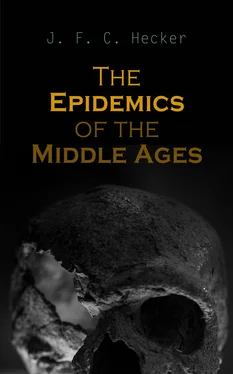1 ...8 9 10 12 13 14 ...22 In all Germany, according to a probable calculation, there seem to have died only 1,244,434 90inhabitants; this country, however, was more spared than others: Italy, on the contrary, was most severely visited. It is said to have lost half its inhabitants 91; and this account is rendered credible from the immense losses of individual cities and provinces: for in Sardinia and Corsica, according to the account of the distinguished Florentine, John Villani, who was himself carried off by the Black Plague 92, scarcely a third part of the population remained alive; and it is related of the Venetians, that they engaged ships at a high rate to retreat to the islands; so that after the plague had carried off three fourths of her inhabitants, that proud city was left forlorn and desolate 93. In Padua, after the cessation of the plague, two thirds of the inhabitants were wanting; and in Florence it was prohibited to publish the numbers of the dead, and to toll the bells at their funerals, in order that the living might not abandon themselves to despair 94.
We have more exact accounts of England; most of the great cities suffered incredible losses; above all, Yarmouth, in which, 7052 died: Bristol, Oxford, Norwich, Leicester, York and London where, in one burial ground alone, there were interred upwards of 50,000 corpses, arranged in layers, in large pits 95. It is said, that in the whole country, scarcely a tenth part remained alive 96; but this estimate is evidently too high. Smaller losses were sufficient to cause those convulsions, whose consequences were felt for some centuries, in a false impulse given to civil life, and whose indirect influence, unknown to the English, has, perhaps, extended even to modern times.
Morals were deteriorated everywhere, and the service of God was, in a great measure, laid aside; for, in many places, the churches were deserted, being bereft of their priests. The instruction of the people was impeded 97; covetousness became general; and when tranquillity was restored, the great increase of lawyers was astonishing, to whom the endless disputes regarding inheritances, offered a rich harvest. The want of priests too, throughout the country, operated very detrimentally upon the people, (the lower classes being most exposed to the ravages of the plague, whilst the houses of the nobility were, in proportion, much more spared,) and it was no compensation that whole bands of ignorant laymen, who had lost their wives during the pestilence, crowded into the monastic orders, that they might participate in the respectability of the priesthood, and in the rich heritages which fell in to the church from all quarters. The sittings of Parliament, of the King’s Bench, and of most of the other courts, were suspended as long as the malady raged. The laws of peace availed not during the dominion of death. Pope Clement took advantage of this state of disorder, to adjust the bloody quarrel between Edward III. and Philip VI.; yet he only succeeded during the period that the plague commanded peace. Philip’s death (1350) annulled all treaties; and it is related, that Edward, with other troops indeed, but with the same leaders and knights, again took the field. Ireland was much less heavily visited than England. The disease seems to have scarcely reached the mountainous districts of that kingdom; and Scotland too would, perhaps, have remained free, had not the Scots availed themselves of the discomfiture of the English, to make an irruption into their territory, which terminated in the destruction of their army, by the plague and by the sword, and the extension of the pestilence, through those who escaped, over the whole country.
At the commencement, there was in England a superabundance of all the necessaries of life; but the plague, which seemed then to be the sole disease, was soon accompanied by a fatal murrain among the cattle. Wandering about without herdsmen, they fell by thousands; and, as has likewise been observed in Africa, the birds and beasts of prey are said not to have touched them. Of what nature this murrain may have been, can no more be determined, than whether it originated from communication with plague patients, or from other causes; but thus much is certain, that it did not break out until after the commencement of the Black Death. In consequence of this murrain, and the impossibility of removing the corn from the fields, there was everywhere a great rise in the price of food which to many was inexplicable, because the harvest had been plentiful; by others it was attributed to the wicked designs of the labourers and dealers; but it really had its foundation in the actual deficiency arising from circumstances by which individual classes at all times endeavour to profit. For a whole year, until it terminated in August, 1349, the Black Plague prevailed in this beautiful island, and everywhere poisoned the springs of comfort and prosperity 98.
In other countries, it generally lasted only half a year, but returned frequently in individual places; on which account, some, without sufficient proof, assigned to it a period of seven years 99.
Spain was uninterruptedly ravaged by the Black Plague till after the year 1350, to which the frequent internal feuds and the wars with the Moors not a little contributed. Alphonso XI., whose passion for war carried him too far, died of it at the siege of Gibraltar, on the 26th of March, 1350. He was the only king in Europe who fell a sacrifice to it; but even before this period, innumerable families had been thrown into affliction 100. The mortality seems otherwise to have been smaller in Spain than in Italy, and about as considerable as in France.
The whole period during which the Black Plague raged with destructive violence in Europe, was, with the exception of Russia, from the year 1347 to 1350. The plagues, which in the sequel often returned until the year 1383 101, we do not consider as belonging to “the Great Mortality.” They were rather common pestilences, without inflammation of the lungs, such as in former times, and in the following centuries, were excited by the matter of contagion everywhere existing, and which, on every favourable occasion, gained ground anew, as is usually the case with this frightful disease.
The concourse of large bodies of people was especially dangerous; and thus, the premature celebration of the Jubilee, to which Clement VI. cited the faithful to Rome, (1350,) during the great epidemic, caused a new eruption of the plague, from which it is said, that scarcely one in an hundred of the pilgrims escaped 102.
Italy was, in consequence, depopulated anew; and those who returned, spread poison and corruption of morals in all directions 103. It is, therefore, the less apparent, how that Pope, who was in general so wise and considerate, and who knew how to pursue the path of reason and humanity, under the most difficult circumstances, should have been led to adopt a measure so injurious; since he, himself, was so convinced of the salutary effect of seclusion, that during the plague in Avignon, he kept up constant fires, and suffered no one to approach him 104; and, in other respects, gave such orders as averted, or alleviated, much misery.
The changes which occurred about this period in the north of Europe, are sufficiently memorable to claim a few moments’ attention. In Sweden two princes died—Håken and Knut, half-brothers of King Magnus; and in Westgothland alone, 466 priests 105. The inhabitants of Iceland and Greenland, found in the coldness of their inhospitable climate, no protection against the southern enemy who had penetrated to them from happier countries. The plague caused great havoc among them. Nature made no allowance for their constant warfare with the elements, and the parsimony with which she had meted out to them the enjoyments of life 106. In Denmark and Norway, however, people were so occupied with their own misery, that the accustomed voyages to Greenland ceased. Towering icebergs formed at the same time on the coast of East Greenland, in consequence of the general concussion of the earth’s organism; and no mortal, from that time forward, has ever seen that shore or its inhabitants 107.
Читать дальше










